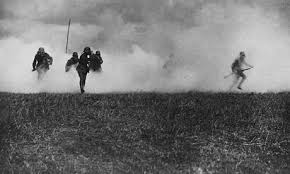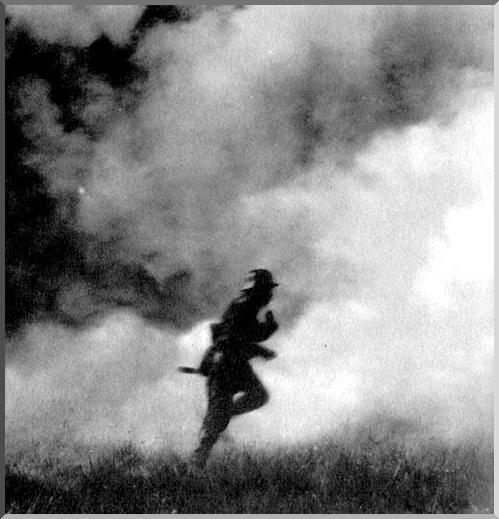German Offensive in West a Ruse;
Russians in East are Main Target.
The War in Verse
Special to The Great War Project
(18-20 May) Over the course of the past two weeks a century ago on the Western Front, fighting intensifies at the Belgian city of Ypres.
It’s being called the Second Battle of Ypres.
The Germans launch another assault on the British and French forces there. But this is a ruse, according to historian Michael Neiberg. The Germans mount their main attack against the Russians on the Eastern Front. But “in order to make their plans work effectively,” writes Neiberg, “the Germans decided on a limited attack in the west to disguise their real intentions.”
They hide their intentions under an enormous cloud of poison gas. “They opened the offensive with 168 tons of chlorine gas,” reports Neiberg, and the French troops on the Allied side fled “in understandable terror.” The Germans also use the gas to compensate for their troop strength at Ypres, which is significantly smaller than the Allied forces there.
This is the first battle in the war where poison gas is used on a large scale.
The plan is for the German troops to attack through the greenish-yellow lethal cloud, “but,” reports Neiberg, “lacking any kind of protection, they refused the orders or at least moved with extreme caution.”
So in the end, the Second Battle of Ypres is not decisive. It “did not produce any major gains for the Germans, but it did throw the Allies off balance and prevented them from detecting the transfer of German units to the east.”
There the German army routs the Russians and forces them into a devastating “Great Retreat.”
Neiberg points to one additional significant result of the Second Battle of Ypres. “It also led all of the great powers to increase the number of resources they put into both gas weapons and gas masks. Now that the Germans use poison gas in great quantities, the Allies “decided to follow suit.”
“The Western Front was about to receive a new and deadly threat.”
It is around this time in the spring of 1915 that some extraordinary poetry emerges from the horrors of the war.
Captain Julian Grenfell is in the midst of the Second Battle of Ypres. From the trenches he writes “Into Battle.” These are the last four stanzas.
In dreary, doubtful, waiting hours,
Before the brazen frenzy starts,
The horses show him nobler powers;
O patient eyes, courageous hearts!
And when the burning moment breaks,
And all things else are out of mind,
And only joy of battle takes
Him by the throat, and makes him blind.
Through joy and blindness he shall know,
Not caring much to know, but still
Nor lead nor steel shall reach him, so
That it be not the Destined Will.
The thundering line of battle stands,
And in the air death moans and sings;
But Day shall clasp him with strong hands,
And Night shall fold him in soft wings.
In mid-May Grenfell is shot in the head. Ten days later he is dead.
Earlier in May a Canadian doctor, John McCrae, who is tending to the soldiers gassed at Ypres, writes one of the most powerful poems of the war: “In Flanders Fields.”
In Flanders fields the poppies blow
Between the crosses, row on row,
That mark our place; and in the sky
The larks, still bravely singing, fly
Scarce heard amid the guns below.
We are the Dead. Short days ago
We lived, felt dawn, saw sunset glow,
Loved and were loved, and now we lie
In Flanders fields.
Take up our quarrel with the foe:
To you from failing hands we throw
The torch; be yours to hold it high.
If ye break faith with us who die
We shall not sleep, though poppies grow
In Flanders fields.



